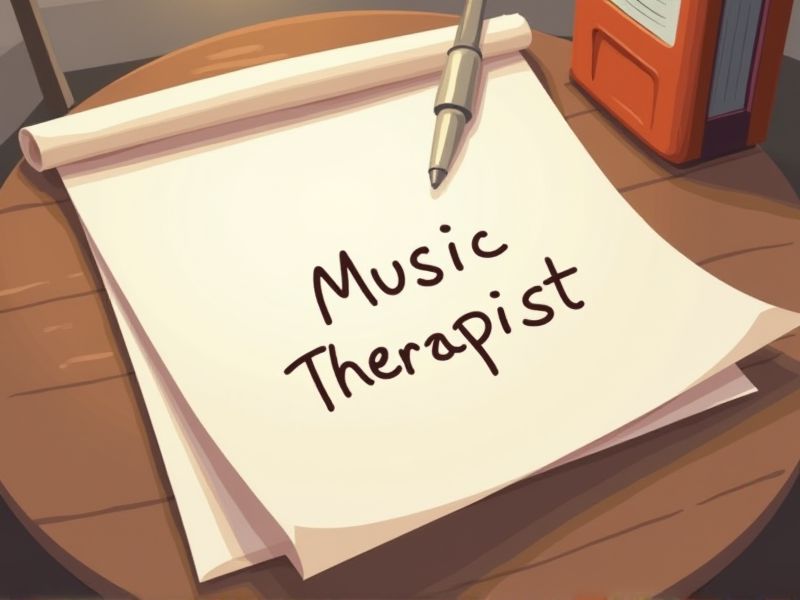
Music therapists work with individuals of varying needs, including mental health, developmental disorders, and physical rehabilitation, requiring a deep understanding of both music and therapy. Certain certifications ensure that these professionals possess the necessary knowledge in psychological theory, clinical methods, and musical proficiency needed to tailor therapeutic interventions effectively. Certification also validates their ability to work within healthcare settings, meeting industry standards and ethical guidelines. Consider these key certifications that might be necessary for a career in music therapy.
Board Certification in Music Therapy (MT-BC)
Board Certification in Music Therapy (MT-BC) ensures that music therapists meet professional standards and are competent in providing therapeutic services. It reassures clients and employers about the therapist's qualifications and dedication to ethical practices. This certification enhances job prospects and often becomes a requirement by healthcare facilities or educational institutions. Continuous certification processes like recertification encourage therapists to stay updated on the latest research and techniques in the field.
Registered Music Therapist (RMT)
Having a Registered Music Therapist (RMT) ensures a standardized level of education and clinical training, which enhances the credibility of music therapy as a profession. Extensive research indicates that RMTs can tailor interventions more effectively to suit individual client needs, improving therapeutic outcomes. The credentialing process instills confidence among healthcare institutions and clients, fostering broader acceptance of music therapy in multidisciplinary teams. Legal and ethical guidelines adhered to by RMTs protect both the therapist and client, ensuring safe and effective therapeutic practices.
State Music Therapy License
The State Music Therapy License ensures that music therapists meet standardized educational and professional requirements, safeguarding the quality of care provided to clients. Licensing regulates the practice of music therapy, preventing unqualified individuals from offering services that could potentially harm patients. It enhances professional credibility and recognition, which facilitates collaboration with other healthcare professionals within legal and insurance-related frameworks. Obtaining a license demonstrates a commitment to ethical practice and continued professional development, fostering trust with clients and the community.
CPR Certification
Music therapists often work with individuals who may have pre-existing medical conditions. Possessing CPR certification ensures a prompt response in the event of a cardiac or respiratory emergency during a session. This preparedness can enhance client trust and safety in therapeutic settings. Having CPR skills aligns with best practices in healthcare-related professions, underscoring the therapist's commitment to comprehensive care.
First Aid Certification
Music therapists often encounter clients who might have unexpected medical emergencies; first aid certification ensures they can provide immediate care. Many therapeutic sessions occur in environments where medical assistance isn't immediately available, making basic first aid skills critical. Certification enhances the therapist's ability to manage risk and ensures a safer therapeutic setting. Understanding first aid can also reassure clients and foster trust, as they know the therapist is prepared for emergencies.
Basic Life Support (BLS) Certification
Basic Life Support (BLS) Certification equips music therapists with essential skills to respond effectively to medical emergencies, ensuring patient safety during therapeutic sessions. A music therapist might work with individuals with complex medical conditions, where the risk of a medical crisis could be higher, necessitating the need for immediate life-saving interventions. Being certified in BLS enhances a music therapist's credibility and aligns with professional standards in healthcare environments where interdisciplinary interactions are common. Having BLS certification might also be a mandatory requirement by certain employers or organizations to comply with health and safety protocols.
Music Therapy Internship Certificate
A Music Therapy Internship Certificate signifies the practical training completed by a music therapist, reinforcing their ability to apply theoretical knowledge in real-world settings. Certification enhances the therapist's credibility, increasing trust from clients and employers in their professional capabilities. Regulatory bodies and professional associations may require this certificate to ensure standardized competencies across the field. Competitive job markets often favor candidates who hold this certification, as it differentiates them by demonstrating verified practical experience.
Music Therapy Supervisor Certification
A Music Therapy Supervisor Certification ensures the therapist possesses the necessary skills to oversee and support other therapy professionals effectively. Certified supervisors have demonstrated a consistent understanding of advanced therapeutic techniques, promoting higher standards of practice within the field. The credential signifies the individual's commitment to maintaining the integrity and professionalism of music therapy. Employers and clients are more likely to trust therapists who have a structured and certified supervisory framework.
Advanced Music Therapy Techniques Certification
Advanced Music Therapy Techniques Certification enhances a music therapist's ability to tailor interventions to diverse populations, improving client outcomes significantly. Specialized training offers the therapist new tools and methods, leading to more effective therapeutic sessions. Certification increases credibility in the field, making therapists more attractive to employers and clients. As the demand for evidence-based therapy grows, this certification aligns a therapist's skills with the latest industry standards.
Continuing Education in Music Therapy Certification
Continuing education in music therapy certification ensures practitioners stay updated with the latest research and therapeutic techniques, enhancing their effectiveness. The evolving nature of mental health and neurological disorders requires therapists to adapt to new methods for better patient outcomes. Regular education fosters professional growth, ensuring therapists meet ethical standards and industry requirements. Music therapists benefit from networking opportunities, sharing insights, and collaborating on innovative treatment solutions.
Summary
You can expect to experience more effective therapeutic sessions when your music therapist holds additional certifications. Certified music therapists often possess advanced skills and knowledge that enhance therapeutic outcomes. These credentials usually ensure adherence to best practices and evidence-based methods. Your engagement in therapy sessions might increase due to the therapist's improved competence and credibility.
